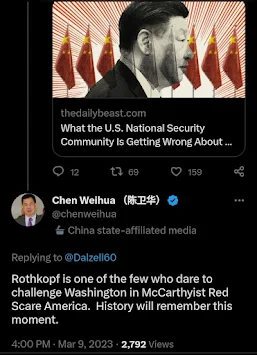In an interview with the Lincoln Project published on January 13, political commentator David Rothkopf said: "I think, at some point, Taiwan will become part of China again" (see video clip below).
Rothkopf endorsed the policy of territorial expansionism of the Chinese Communist Party (CCP) and misled the public by repeating some of its talking points.
For example, Rothkopf falsely stated that Taiwan has been part of China for a long time.
In fact, the People's Republic of China (PRC), which was founded in 1949, never ruled Taiwan. Claiming that Taiwan was part of the PRC is as absurd as claiming that Ukraine was part of the Russian Federation, or that South Korea was part of North Korea.
David Rothkopf echoed the CCP's ethnonationalist agenda, which denies Taiwan's statehood on the basis of the arbitrary dogma of national identity and territorial irredentism defined by the Politburo and radical nationalists. Again, it's reminiscent of Putin's denial of Ukrainian statehood.
The CCP arbitrarily defines itself as the sole representative of China and custodian of national identity. Accepting the CCP's agenda means aiding a dictatorial regime's political ideology.
In recent weeks, Rothkopf has been busy defending the CCP and downplaying its threat. In an NPR interview on March 10, Rothkopf said:
"[W]hen we view [China] as a threat, then we put ourselves into a kind of confrontational position, which can actually damage our interests and make things more dangerous ...
"[T]he risks of going too far are that we heighten tensions and we create situations that accidentally escalate. You can look at, for example, the situation with Taiwan last year when Nancy Pelosi went there. The Chinese felt they had to respond. We felt we had to respond to the Chinese. You could imagine an accident or, you know, some other kind of event that would trigger conflict. We need to be careful of that."
Rothkopf not only downplays, but covers up for the CCP's aggressive policy, and blames the US for standing up for a free society that does not wish to be incorporated into Beijing's autocratic empire. He blames Pelosi. But he doesn't blame the CCP for threatening to invade Taiwan. He refers to the CCP as "the Chinese." Conflating an unelected one-party regime with an entire country is as if, in a post-coup Trump-controlled US, people referred to the Trump autocracy as "the Americans."
On March 9, Rothkopf published an op-ed titled "What Washington Is Getting Wrong About Dealing With China". It's another piece promoting a pro-CCP message. Not surprisingly, Rothkopf's article was praised by people such as Chen Weihua, the EU Bureau Chief and columnist for the PRC's state media China Daily.
The interesting thing is that Rothkopf supports Ukraine against Putin's invasion. A baffling case of cognitive dissonance.
_____
If you want to support me, you can make a donation on my ko-fi profile, or take a look at some of my books on Amazon. Thanks!

Comments
Post a Comment